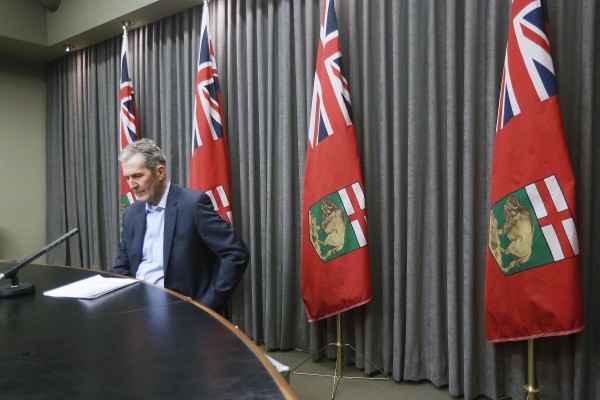Ontario’s priority should be public health—not profits and police
We need a break from the logic of the Ford government: that death and disaster are an acceptable cost in the pursuit of profit

The Ford government’s public health priorities have failed almost unceasingly to deliver the results we need to put an end to the COVID-19 pandemic. Photo from Twitter.
As the third wave wreaks havoc on the province, popular discontent with the Ontario government’s pandemic response has reached a fever pitch. Friday’s announcement that police would receive enhanced powers to enforce public health guidelines, outdoor recreation would be severely limited, and provincial paid sick days would remain off the table was immediately met with outrage and confusion across social media.
And for good reason. New restrictions are not just detached from reality (we know outbreaks are not occurring on campsites or playgrounds), but they also reflect the government’s longstanding and frustrating commitment to individualizing the pandemic—a tactic to keep workplaces open, employment numbers high, and profits healthy. “Negligent” and “incompetent,” popular and apt descriptors of Premier Doug Ford’s COVID-19 response, have continually failed to sufficiently capture the bankruptcy of the government’s approach.
Deflecting attention from taking real action on “congregate settings” where spread has been most acute (warehouses, farms, offices, prisons, and shelters) Ford hosts his pressers like a disappointed parent, telling Ontarians to do our part, to stay vigilant, and to stay home. Yet when things fail to improve, because they never had the chance to, these appeals intensify.
We’re then handed increased police powers, extended but weak-tea “lockdowns,” and crackdowns on outdoor activities. While the province now appears to be walking back some of the new police powers, the fundamental assumptions remain the same: it is individuals, not bosses or politicians, that are responsible for spread.
Occasionally, an industry will be shut down, but rarely without an asterisk. “Non-essential” construction, for example, may no longer be permitted, but a laundry list of activities still are.
The government’s public health priorities, oriented around busting clandestine university parties instead of shutting down food processing plants, have failed almost unceasingly to deliver the results we need to take down COVID-19. Meanwhile, Ford has hedged his bets on vaccines, which are both going unclaimed and facing shortages—a situation buoyed by poor government messaging, weak infrastructure, and even worse coordination.
An alternative agenda
Ontarians know the answer is not more police, as expanded law enforcement measures will almost certainly have a disproportionate impact on people of colour, who are already over-represented in essential work. We know profits should be a low priority during a public health crisis. And given the data, we know the central issue is not guideline-shunning bogeymen having super-spreader events indoors (policing of which is neither desirable nor effective). The primary vector of disease spread is large workplaces and other congregate settings where profit remains the guiding principle.
But the situation isn’t immovable. If pushed by an organized force, an alternative agenda could take root in Ontario after which lives would be saved, and we would be closer to putting the pandemic in our rear-view.
What might that agenda look like? For one, we need a real commitment to public health with provincially-mandated paid sick days (filling the gap left by the wholly inadequate Canada Recovery Sickness Benefit). Paid sick days are undeniably expensive for employers—which is why provincial governments have avoided legislating them—but profits should not trump health, now or ever. Ramping up our commitment to that fight is central at this point in the pandemic. Relatedly, an all-out shutdown of all businesses except the most essential is paramount as needless and avoidable outbreaks beset offices and manufacturing plants.
But these measures would be incomplete without an ambitious, around-the-clock vaccination program that prioritizes those who need it most; ramped-up unemployment supports; and eviction bans for the duration of the pandemic. And, of course, we must fight any attempt to empower police to enforce public health guidelines.
If social media is any barometer—and during a worldwide pandemic in which gathering is less possible, it has to be—there is hunger for change. All factions of the left need to propose an alternative agenda at the scale of the crisis that prioritizes public health over profit and police. Only then can we break with the lethal logic underpinning the Ford government: that death and disaster are an acceptable cost in the pursuit of profit (and high employment numbers rolling into the next election).
Dan Darrah is a writer of nonfiction and poetry from Toronto. He has written about work, culture, money, and debt for Jacobin, Canadian Dimension, Briarpatch Magazine, and more. He is a member of Spring.










